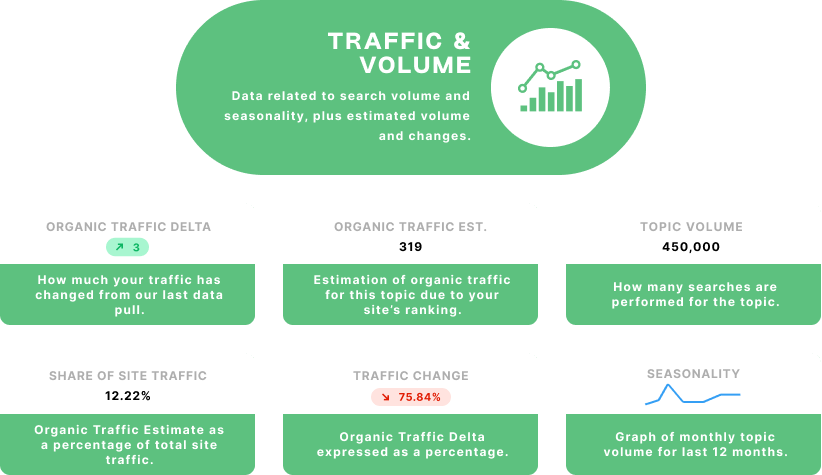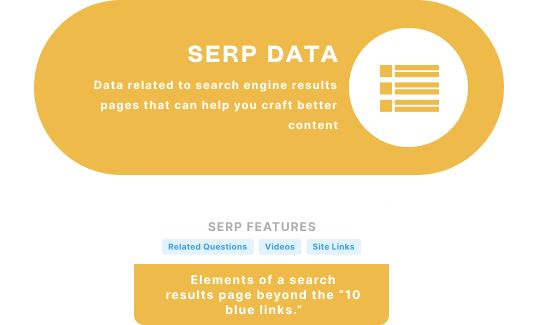Using MarketMuse Topic Inventory Metrics (Cheat Sheet)
MarketMuse Topic Inventory offers seven pre-made template views to help get a handle on the 34 different data points that are available. But at some point you’re going to want to create your own Save Views to better match your workflow and needs.
I’ve taken all the metrics and grouped them based on their functionality, so you can get a better idea of what they do and how to use them. If you need individual metric definitions, you’ll find them in the platform and the Knowledge Base.
Naturally you’ll want to combine these metrics in the views you create. For example, a Saved View using a combination of Potential along with Difficulty & Authority metrics can help isolate topics with good monetary potential where you stand a good chance of success.

Value
This data helps you recognize the value generated from your coverage of a topic and how much $$$ you’re leaving on the table.
- Share of Site Value
- Value Delta
- Value/Mo
These data points are for anyone with an interest in establishing a monetary valuation of their content.
Value/Mo is a monthly dollar figure based on estimated traffic (which takes into account SERP position and SEPR features) for the topic across all ranking pages multiplied by the value per visit. The value per visit can be defined in the settings although I prefer to use the default, cost-per-click (CPC). Google Ads is an efficient market and the pricing matches closely with high-purchase-intent terms. In other words, if I was going to pay for this traffic, Value/Mo is how much it would cost.

Potential
These metrics help to understand what can be realized by making some modest updates to your content.
- Potential Traffic
- Potential Traffic Gain
- Potential Value
Metrics dealing with potential work well in concert with the value metrics and are ideal for anyone looking to justify their content plan.
As stated in the previous section, these metrics are based on a realistic assessment of your potential to increase in rank according to your current position. The change in rank affects traffic which in turn affects value. MarketMuse uses a sophisticated calculation for estimating traffic using variable click through rates based on position and SERP features.

Difficulty & Authority
Metrics in this section provide insight into how much work is required to cover a topic and the likelihood of success.
- Avg. Page Authority
- Competitive Advantage
- Difficulty
- Personalized Difficulty
- Topic Authority
SEOs and content strategists frequently rely on keyword difficulty data when building out content plans. If that’s you then you’ll want to make use of this data.
Make sure you take advantage of Personalized Difficulty, a MarketMuse proprietary metric that offers a superior assessment of keyword difficulty that takes into account your site’s content and its performance. It’s good to pair up Personalized Difficulty (which helps determine how much work is required) with Competitive Advantage (the likelihood of success). The best situation is one where you’re pursuing topics that have low Personalized Difficulty (they’re easy for you) combined with high Competitive Advantage (you have a strong leg up over your competitors).
Note that Avg. Page Authority is an average because multiple pages can have authority for the same topic.

Ranking
Indicates page performance based on topic.
- Related Pages
- Rank
- Top Ranking URL
I like to think of ranking like stock prices. If you have a longer term outlook, then you’ll find this data useful. But if you need minute-by-minute ranking changes to validate your plans, then you’ll want to look elsewhere.
Related Pages indicates how many pages address the same topic, whether they’re ranking or not. This can be helpful in getting a better understanding of how your site covers a specific topic. Top Rank and Top Ranking URL shows the best page that’s ranking for the topic.
Typically these data points are used for striking distance strategies where you prioritize content updates based on their position in the SERP. Usually SEOs look for candidates ranking between roughly 6 and 20 in the search results.

Traffic & Volume
Data related to search volume and seasonality, plus estimated volume and changes.
- Organic Traffic Est.
- Organic Traffic Delta
- Seasonality
- Share of Site Traffic
- Traffic Change
- Topic Volume
Many SEOs use search volume (Topic Volume) in combination with Keyword Difficulty as their primary strategy. We don’t recommend it, but if that’s your preference then you’ll want to make use of this metric.
Related to volume, and much more interesting, are the traffic metrics. These can help isolate topics around which may be losing traffic. Organic Traffic Delta is the change from the previous month (a number) while Traffic Change is a percentage. You can combine the two to find large percentage movements while eliminating small absolute changes which can skew results. For example, a topic doubled its traffic this month, but only had 10 visits to begin with.

SERP
SERP data to help you craft better content.
- SERP Features
SERP data can help SEOs and content strategists from blindly targeting topics.

Interactions
This data is created based on your input and interactions with the platform. Use this data to determine if you have or haven’t taken action on topic(s) of interest.
- Assignees
- Content Briefs
- Due Dates
- Plans
- Published On
These data points can assist those who are responsible for managing content projects as well as those creating the plans.
For example, if you’re researching topics around new content, including any of these in a view shows whether it’s currently a work in progress or not. Alternatively, you may want to search for content update candidates based on the existence of a date published.
Note that “Due Dates” counts how many due dates exist for the topic and displays that integer. The reason for this is that there can be multiple pages that cover the same topic, each with their own date. The same applies to the “Published On” column.
Takeaway
MarketMuse metrics give you a distinct advantage. They go far beyond standard SEO data points because they’re based on your site’s content. While your competitors are crippled by their reliance on the same metrics as everyone else, you’re not. So use this to your advantage in constructing content plans that are quantifiable and more likely to succeed.
What you should do now
When you’re ready… here are 3 ways we can help you publish better content, faster:
- Book time with MarketMuse Schedule a live demo with one of our strategists to see how MarketMuse can help your team reach their content goals.
- If you’d like to learn how to create better content faster, visit our blog. It’s full of resources to help scale content.
- If you know another marketer who’d enjoy reading this page, share it with them via email, LinkedIn, Twitter, or Facebook.
Stephen leads the content strategy blog for MarketMuse, an AI-powered Content Intelligence and Strategy Platform. You can connect with him on social or his personal blog.
